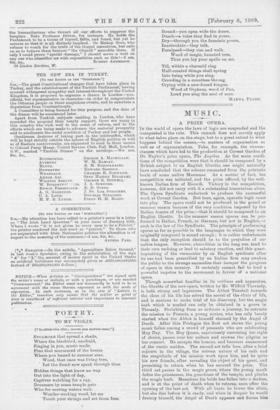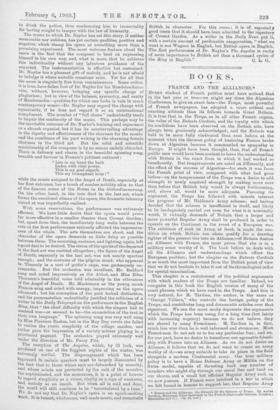M U SIC.
A PRIZE OPERA.
Ix the world of opera the laws of logic are suspended and the unexpected is the rule. This remark does not merely apply to what takes place on the stage, but to a great extent to what happens behind the seenes,—to matters of organisation as well as of representation. Take, for example, the circum- stances which have led to the production at Covent Garden of Dr. Na.ylor's prize opera, The Angelus. As the main condi- tions of the competition were that it should be composed by a British subject to an English libretto, one might naturally have concluded that the scheme emanated from the patriotic brain of some native Maecenas. As a matter of fact, the competition was initiated, and the prize offered, by the well- known Italian firm of Ricordi. Victory in the competition, however, did not carry with it a substantial honorarium alone. The Opera Syndicate undertook to produce the successful work at Covent Garden. But here, again, operatic logic came into play. The opera could not be produced in the grand or summer season because of the very condition imposed by the Italian donors of the prize,—that it should be composed to an English libretto. In the summer season operas can be per- formed in Italian, French, or German,•but not in English,— such is the law of the Syndicate. The principle of performing operas as far as possible in the languages to which they were originally composed is sound enough ; it is rather unfortunate that the only exception should be to the prejudice of our native tongue. However, absurdities in the long run tend to their own undoing or lead to salutary reaction, and this quasi- boycotting of the vernacular by an English syndicate after its use had been prescribed by an Italian firm may awaken the public to the strange anomalies that hamper the progress of opera in this country. It certainly cannot fail to lend a powerful impetus to the movement in favour of a national opera.
Though somewhat familiar in its outlines and apparatus, the libretto of the new opera, written by Mr. Wilfrid Thornely, is both strong and ingenious. The Abbot Tunstall towards the close of his life has solved the secret of the elixir of life, and is anxious to make trial of his discovery, but the magic herb which is needed can only be obtained in a grove in Thessaly. Shrinking from so arduous a journey, he entrusts the mission to Francis, a young novice, who has only barely started when the Abbot is himself claimed by the Angel of Death. After this Prologue the first act shows the young monk fallen among a crowd of peasants who are celebrating May Day. The May Queen, capriciously exercising her right of choice, pusses over her suitors and crowns the pilgrim as her consort. He accepts the honour, and becomes enamoured of the rustic maiden. The second act tells how, after a brief sojourn in the village, the solemn nature of his oath and the magnitude of his mission work upon him, and he quits his new friends, after revealing the object of his quest, and promising to return when he has secured the prize. The third act passes in the magic grove, where the young monk defies the priestesses, the guardians of the temple, and plucks the magic herb. Meantime his bride has fallen into a decline, and is at the point of death when be returns, soon after the opening of the last act. With all baste he brews the elixir, but she dies before it is ready, and when in despair he would destroy himself, the Angel of Death appears and forces him to drink the potion, thus condemning him to immortality for having sought to tamper with the law of humanity.
The music to which Dr. Naylor has set this story, if neither memorable nor sublime, has yet certain qualities, positive and negative, which stamp his opera as something more than a promising experiment. The most welcome feature about the score is the fact that the composer is bent on expressing himself in his own way, and, what is more, that he achieves this individuality without any laborious avoidance of the , expected. The instrumentation is effective but restrained. Dr. Naylor has a pleasant gift of melody, and he is not afraid to indulge it where suitable occasions arise. Yet for all that the score is singularly free from reminiscences. Some critics, It is true, have fallen foul of Dr. Naylor for his Mendelssohninn vein, without, however,' bringing any specifics charge of Plagiarism; but in view of the balance, symmetry, and sanity of Mendelssohn—qualities for which one looks in vain in much contemporary music—Dr. Naylor may regard the charge with equanimity, if he does not regard it as an unintentional compliment. The number of "full closes" undoubtedly tends to impair the continuity of the music. This perhaps may be the inevitable outcome of Dr. Naylor's training and experience as a church organist, but it has its countervailing advantage in the dignity and effectiveness of the choruses for the monks and the excellence of his part writing in the charming female choruses in the third act. But the solid and scientific musicianship of the composer is by no means unduly obtruded. There is delicacy and charm in the beautiful spinning song, breadth and fervour in Francis's jubilant outburst : "Lies in my hand the herb Laden with vital power. This is my goal superb, This my triumphant hour !"
while the music assigned to the Angel of Death, especially at her first entrance, has a touch of sombre nobility akin to that of the famous scene of the Norns in the GOtterdmmerung. On the other hand, in the love duet in the last ad, which forms the emotional climax of the opera, the dramatic intensity aimed at was imperfectly realised.
With some reservations, the performance was extremely efficient. We have little doubt that the opera would prove far more effective in a smaller theatre than Covent Garden; but, apart from that, the inordinately long waits between the acts at the first performance seriously affected the impressive- ness of the whole. The acts themselves are short, and the character of the opera demands as little delay as possible between them. The mounting, costume, and lighting, again, left a good deal to be desired. The vision of the spirits of the departed in the first act was omitted altogether; the figure of the Angel of Death, especially in the last act, was not nearly spectral enough ; and the costume of the pilgrim monk, who appeared in Thessaly in a sort of golfer's cape, was grotesquely un- romantic. But the orchestra was excellent, Mr. Radford sang and acted impressively as the Abbot, and Miss Edna Thornton's beautiful voice told admirably in the utterances of the Angel of Death. Mr. Maclennan as the young monk Francis sang and acted with energy, improving as the opera advanced; but his conception of the part lacked distinction, and his pronunciation undoubtedly justified the criticism of a Writer in the Daily Telegraph on the performers in the English Ring, that "the chief difficulty with which the singers had to Contend was—or seemed to be—the enunciation of the text in their own language." The spinning song was very well sung by Miss Florence Easton, but in the May Day revels she failed to realise the rustic simplicity of the village maiden, and rather gave the impression of a variety actress playing in a Provincial pageant. The orchestra played extremely well under the direction of Mr. Percy Pitt. The reception of The Angelus, which, by ill luck, was Produced on one of the foggiest nights of the winter, 'was eXtremely cordial. The disparagement which has been bltpreseed in certain quarters must be largely discounted by the fact that to those whose ears are debauched by sonority, and whose minds are perverted by the cult of the macabre, the sophisticated, and the monstrous, it is a point of honour to regard simplicity as a crime, clarity as a sign of weakness, and melody as an insult. But when all is said and done, the world will still continue to be " tarantulated by a time." We do not say that Dr. Naylor's opera is an epoch-making 'work. It is honest, wholesome, well.made music:, and essentially British in character. For this reuse.' it is of especially good omen that it should have been admitted to the repertory of Covent Garden. As a writer in the Daily News put it, with a certain amount of pardonable exaggeration, "what we want is not Wagner in English, but British :opera in English. The first performance of Dr. Naylor's The Angelus is really of more importance to British art than a thousand cycles of










































 Previous page
Previous page